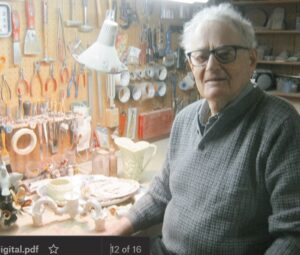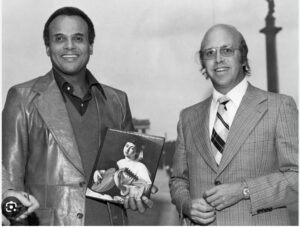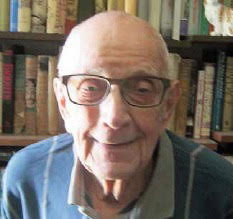
Unlike most other people I have written about in this column over the past few months, my relationship with the late Jerry Shore did not extend back 30 years or more. I only met Jerry one time and that was just a couple of years ago – a few months before he passed away. But where colourful characteristics are concerned, he really stood out.
He had just turned 90 when I met with him in his small apartment downtown surrounded by his cookbooks and his scrapbooks with all the stars of the entertainment world that he worked with for over a career of almost 70 years.
Jerry Shore’s life story is one that most people in the world can only dream about. The lifelong Winnipegger worked with the biggest names in music in all its various genres. He had albums full of signed photos of rock stars, opera greats, leading country and western singers, popular singers, and prominent actors – as well as a politician or two.
The show business tour manager and talent booker’s clients included Harry Belafonte, Nana Mouskouri, the flamboyant pianist Liberace, Richard Tucker and many others.

As with many successful people, Jerry just happened to be in the right place at the right time. The first big break for the kid from River Heights came about while he was at university. He became friendly with of his professors – one James Wilson who had stood for office as a Liberal candidate.
“I was a young Liberal and worked on his campaign,” Shore recalled. “He was on the organizing committee that had been created to form Rainbow Stage. That was in the mid-1950s. I was a member of the Board and/or director of promotions off and on for 20 years.”
It was through Rainbow Stage that Jerry became associated – in the mid-1960s - with Maitland Steinkopf. “Maitland Steinkopf was one of the most amazing people I have ever met,” Shore noted.
Steinkopf, the former MLA and cabinet minister in the Duff Roblin years and all-around community leader, was one of the principal organizers of the Man-Pop Festival, Winnipeg’s first ever major outdoor rock concert, on Saturday, August 29, 1970. The concert at the old stadium featured headliners such as Led Zeppelin, Iron Butterfly, Chilliwack and The Youngbloods.
I was there. Friends bought me a ticket. So was Jerry, as it happens, as one of the organizers.
What I remember about it was that the day dawned bright and sunny. But, around noon, the clouds rolled in, and it poured. After a delay of several hours, we were all moved into the old arena where the concert resumed and lasted until after 3:00 A.M.
Jerry recounted how Steinkopf made arrangements to move the concert to the arena and borrow equipment on short notice from all over the city. “Maitland got the fire marshal to ignore the capacity limits at the arena,” Jerry recalled. “It was an amazing concert,” he recalls.
He was also by Steinkopf’s side when the concert hall was being built in the mid-1960’s (“he almost single-handedly raised most of the money to build the Concert Hall”) and booked the first act.
That would have been the opera star Richard Tucker. Tucker, Shore recalls, was very protective of his voice. The morning of the concert, the opera star called for Shore to pick him up in the early afternoon.
“Although it was a hot day in May, Tucker came out of the hotel wearing an overcoat, scarf and hat,” Shore recounted. “He wanted me to drop him off at a movie theatre where he spent the next three hours. He didn’t want to have to talk to anybody.”
Shore notes that he became involved in the world of opera after going to Minneapolis to attend a performance of the Metropolitan Opera on tour. “I met some of the people involved and we became friendly,” he recounts. “I arranged to hold auditions in Winnipeg for the Metropolitan Opera. I also arranged a Canadian tour.”
Other opera stars with whom he has worked have been Jan Peerce, Joan Sutherland, Robert Merrill and Pavarotti.
The second act that Shore booked at the Concert Hall was Harry Belafonte. “We became really good friends. He came back for a second show 18 months later. Harry was very meticulous. He had hired a new manager just before his second Winnipeg appearance. He moved on to Regina after the Winnipeg show. A couple of days later, I get a call from him. He had fired his new manager and wanted me to take over as his tour manager.”
Jerry organized three tours for Belafonte (whom he recalls as quite shy as well as outspoken on race relations). “I was in charge of booking fights and ground transportation, hotels, everything, even paying the staff.”
The highlight of his time with Belafonte was his tour of Cuba. “Harry was the first American artist to visit Castro’s Cuba,” Jerry recalled. “CBC was doing a special on Harry Belafonte and his roots. There were 30 of us in the group. We get off the plane and there are men in uniform with sub-machine guns everywhere. It was a little scary.”
The Cubans, Jerry remembered, treated Belafonte and family like royalty – the rest of the group not so much.
“The hotel we were staying at was the National – that had been built by gangster Meyer Lansky,” Jerry reported.
The next morning, the group was informed that Fidel Castro himself is coming to visit. “Fidel pulled up outside the hotel with two armoured cars in front and in back. His English was very good, and he was an imposing figure. He gave each one of us a bear hug.”
The three celebrities that he says most impressed him were Liberace, Sir Lawrence Olivier, and Bill Clinton. He recalls an appearance by Bill Clinton in Winnipeg about 20 years ago.
“We had arranged a private function at Dubrovnik Restaurant before he spoke,” Jerry recounted. “The first thing Clinton did on entering Dubrovnik was to shake hands with all the bartenders and serving staff. He did the same thing at the Concert Hall.
“He had an aura about him. He had the common touch.”
Surprisingly, so did the award-winning actor Olivier. “Larry” was appearing at a news conference at the Fort Garry Hotel – a conference that Jerry was chairing. Jerry recalled that Olivier went up to each of the 30 journalists and introduced himself.
As for Liberace, Jerry remembered an exchange he had with former Winnipeg radio star Peter Warren. It was Liberace’s first visit to Winnipeg and Warren asked the last question at the press conference. The ever-skeptical Warren asked something along the lines of why anyone would be foolish enough to buy tickets to the pianist’s concerts. Liberace’s response was that anyone who wouldn’t want to buy a ticket to one of his concerts would be the fool.
Liberace, Jerry recounted, used to carry around a Crown Royal bag with him wherever he went. “I never asked him what was in it,” Jerry said. “But one time when I was with him, a clerk in a store asked what was in the bag. Liberace said that in the bag was his insurance policy. He opened it to show that it was filled with cut diamonds, rubies, and emeralds.”
One other singer who Jerry describes as larger than life was the ersatz Russian, Ivan Rebroff. (He was actually German.) He was a large man with a big voice and an appetite to match.
“I have never seen a guy eat so much,” Jerry recalled. “One time in Calgary, he phoned room servicer to bring him breakfast – ten croissants, ten Danish and three litres of milk.
“Another time, he was staying at the Beverly Wiltshire in L.A. He orders from room service two breakfasts and six desserts.”
Shore completely retired just three years before I had the opportunity to interview him.
Ironically, Shore observed, for all the travelling he did throughout his career, he had seen very little of the world. “The routine was to get off the plane,” he said, go to the hotel, spend four or five days preparing for the concert than boarding the plane again for the next city.”
Jerry spent his last years’ time reading (mystery novels and biographies), watching favourite TV shows and enjoying his vast collection (over 800) of cookbooks. He kept in touch with friends from show business who were still around. But, he said, he didn’t miss being part of the scene.

“It’s not like it used to be,” he noted. “The personal touch is no more. All the little guys like me have retired or been pushed out by corporate operators.
“Looking back, I am satisfied with what I accomplished and am comfortable with my life.”

